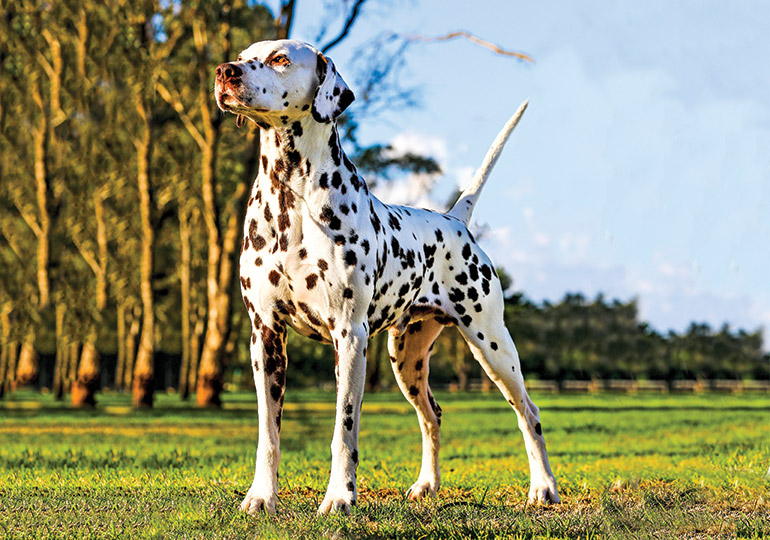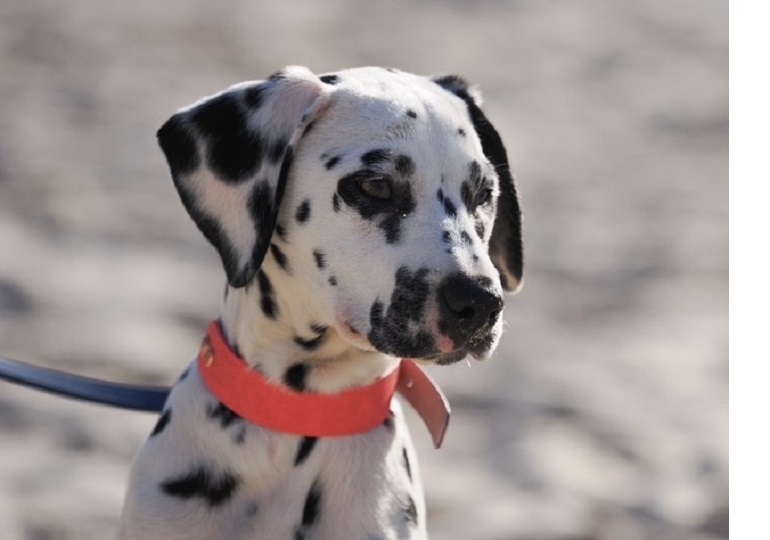
GROUP 7 - NON SPORTING
The Dalmatian has a disputed heritage. Researchers cannot agree as to the origin, but they agree that through many centuries the breed has remained unchanged. Bands of gypsies, or Romanies, had Dalmatians so they were known in many places. The first definite location was Dalmatia, hence the name Dalmatian. The breed was also known by many nicknames, such as English Coach Dog, the Carriage Dog, Plum Pudding Dog, Fire House Dog and Spotted Dick.
This very versatile dog has been used as a sentinel on the borders of Dalmatia and Croatia, as a shepherd, catching rats, heroic performances with following fire trucks, fire house mascot, bird dog, trail hound and retriever. A retentive memory made the Dalmatian a great clowner in circuses, but most importantly was its status as the one and only coaching dog.
The Dalmatian made its first appearance in a dog show in Great Britain in 1860, but didn’t appear in American shows until the 1920’s.
Spotted, pure white, short coat with clearly defined jet black spots, or in the liver variety, deep brown spots. One of the most easily recognised breeds.
The Dalmatian is medium sized, well balanced, elegant and athletic. Physically fit for road work with speed and endurance. The instinct for coaching is bred into the breed, as is his affinity with horses.
Average Weight: Males 25 kg, Females 23 kg
The Dalmatian should be friendly and outgoing, neither nervous nor aggressive. Usually quiet but an ideal guard dog. Dalmatians are happy and full of life, but sometimes over enthusiastic and boisterous. They are keen to please, so therefore are easy to train, however, they can get bored if the training is not varied.
The Dalmatian is a strong hardy dog with few health issues. Deafness is a problem and all puppies should be Brainstem Auditory Evoked Response (BAER) tested at about 7 weeks old. Most breeders will give puppy owners a copy of the BAER test results so they know if the puppy has bilateral hearing or unilateral hearing and not deaf. Deaf dogs can be trained and lead a healthy life, but they need a special home with committed owners.
Dalmatians have a propensity to urinary stones. Best preventatives for stone forming in Dalmatians are those of diet and probably of water intake. Some dogs can be helped with special dog food, otherwise they require medication or surgery.
Dalmatians make great family dogs, as they are loyal and gentle, but mostly they love whoever feeds them. Dalmatians are a running dog so they need daily exercise. They may not always be keen to return to you if preoccupied with having fun in the park or on the beach. They are gentle with children but are boisterous, so be careful with very small children.
Words: Dianne Wright, on behalf of the Dalmatian Club of NSW
Image by Ffire Photography
Now you know a little about the Dalmatian, you may think that this is the dog for you. Before you make a decision, please make contact with the breed club or your State controlling body for purebred dogs. They will be able to give you information about available puppies and also suggest dog shows where you can see the breed and speak to breeders. In this way you will gain a better perspective of the Dalmatian and its needs, and whether this breed would suit your lifestyle.
